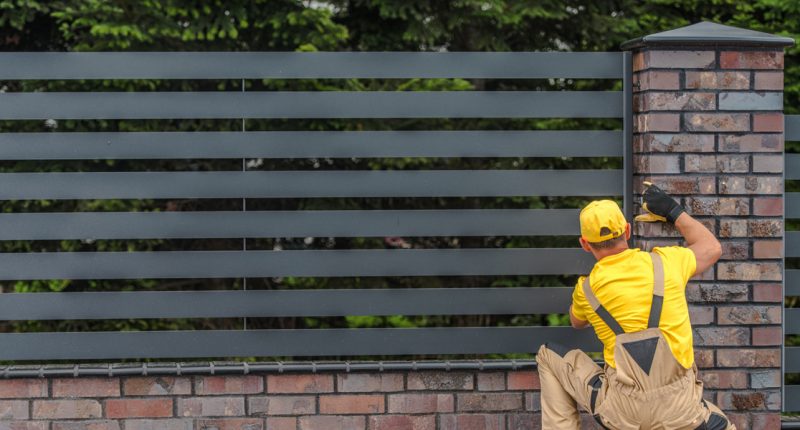Can you install a fence in the winter? Despite popular belief, professional fencing companies can install fences in cold weather as in the warmer seasons. Likewise, you should only install fences that can withstand snow and below-freezing temperatures regardless of when you get them installed.
Due to the stiffness of the ground and inclement weather, installing a fence in the winter can be more challenging, but professionals with the right tools know how to get it done successfully.
To learn more about 2021 fence trends and why you should build a fence in the winter, check out professional service pages in your area and explore your fencing options. The world of fencing is vast with new ideas, many of which are ideal for building in the colder months.
Why Build a Fence in the Winter?
If your current fence is badly damaged, you may not have time to wait until the ground thaws in the early spring. If you moved to a new property in the winter months, you might not want to wait another season to complete your home’s landscaping. Additionally, if you’re trying to sell your home, you may not have time to wait until spring.
Regardless of the circumstances, some families cannot afford to wait until the ground softens in the spring. Luckily, if you live in an area with a relatively warmer climate all year round, such as Louisiana, you won’t have to worry too much about snow or near-freezing temperatures hardening the ground. You can easily hire a fence building company the moment the need arises.
Visit your local residential fence builder’s service page to learn more about chain link fencing installers in baton rouge.
How Cold Weather Impacts Fences
One of the first questions you’ll face when your family wants to install a fence (after figuring out “can you install a fence in the winter?”) is “what material do you want to use for your fencing?”
Fencing companies build fences with a range of materials, including:
● Vinyl
● Metal
● Wood
● Bamboo
● Chain link
● Aluminum
● Mixed material
When considering fence builds, you should first think of the yearly environment your fence will be subjected to. Wood fences require maintenance each year before the winter season hits so they can last without degrading. Vinyl fences stand out in this regard, as they require no maintenance to enter winter.
Regardless, keep in mind that while vinyl fences offer longevity, sharp temperature changes can weaken the wall, rendering it brittle and prone to cracking upon impact. To prevent damage, avoid hitting your fence with snow shovels or piling snow up against it.
How are Fences Installed in the Winter?
Installing a fence in the winter is only challenging if the temperature is low enough to freeze the ground. This is because professionals need to install fence posts deep enough to render the fence sturdy and durable. If the ground is stiff or frozen, installers need specialized tools to dig beneath the frozen earth.
In most cases, fence companies use jackhammers to pierce through the ground and create a hole deep enough for installation. If you live in colder climates, you run the risk of the concrete – used to secure posts – freezing before installation is complete. Fencing installation companies can mix additives into the concrete that resist freezing, meaning you should only contact professionals if you need a fence installed in the winter months.
Your Best Bet for Installing a Fence in the Winter
Have you decided it’s time to install a new fence? It’s good to keep a few things in mind. Typically, experts recommend installing vinyl and wood fences in the fall or spring, as rapid weather changes make installation more difficult.
If you decide to move ahead with the project in the winter, consider aluminum or mixed material fences. For other projects, like driveway gates, the project will be less impeded by the weather as a traditional yard fence.
Aluminum Fencing
While aluminum fences offer less privacy, they offer the best durability of any fence on the market – and homeowners can even customize them to match their porch railings and other outdoor fixtures of their home. These non-privacy fences are in high demand in Baton Rouge and throughout Louisiana. Additionally, aluminum fences require very little maintenance, sporting durable designs that fit nearly every home.
Mixed Material Fencing
Mixed material fences combine wood, cinderblock, metal, vinyl, or any other fence material to create a unique look that sets your fence apart from your neighbors. Utilizing the strengths of various materials, you can combine their strengths to make a secure and stable fence that will last you years. Design a stunning custom look that lets your home stand out in the best way possible.
Driveway Gates
Adding a driveway gate to your property increases security while adding a distinguished look to your property. Should you decide to go with black metal, one of the most popular designs, your installer should have little trouble digging into the concrete and grass and erecting the gate.
However, homeowners tend to match their driveway gates to their current fencing or install completely new fencing along with driveway gates. This unified look works very well but may be more challenging to achieve in colder months if your yard fencing is made of wood, vinyl, or other less resistant materials.
Cutting-Edge Fence Design Services in Louisiana
Can you install a fence in the winter? Of course, you can! You just need the right professional fencing company for the job.
Ready to move forward with your family’s new fence installation project? Call (225) 230-1798 to get in touch with Forrest Scott Fencing, the best fence company in Walker, LA, and secure your property with a fence that will last you season after season.




